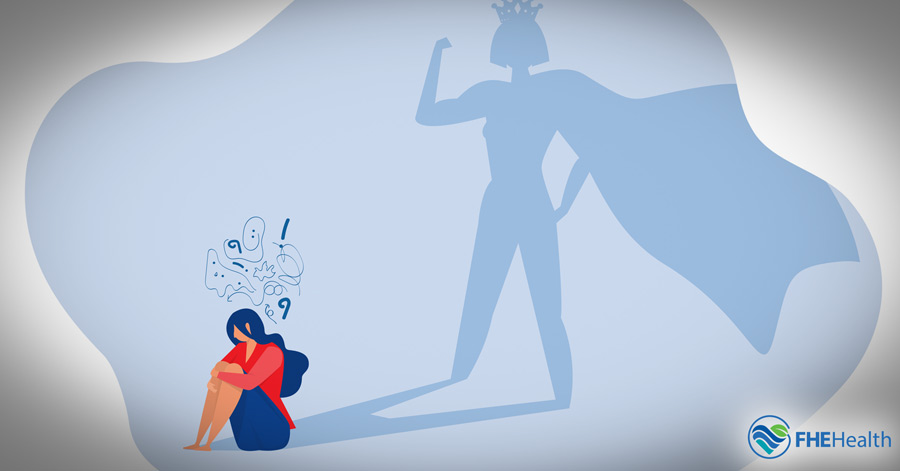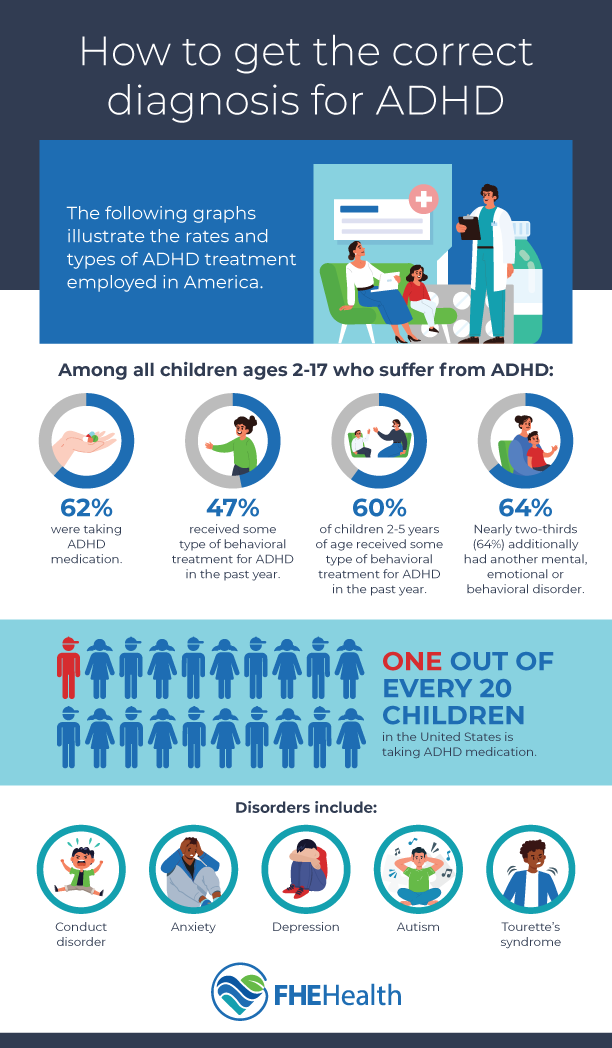
Awareness of neurodevelopmental disorders like attention-deficit/hyperactivity disorder (ADHD) has reached an all-time high, thanks in part to a greater understanding of what these conditions are and how they affect people. Consequently, many people are realizing in adulthood that they may have ADHD and never received a proper diagnosis as children.
It’s also not uncommon for parents and caregivers to worry about whether their children are receiving the proper medical care for their symptoms. Many people are scouring the internet, taking ADHD tests, and looking up ADHD diagnostic criteria. To help with some of these inquiries, we’ll dive into what ADHD is, who can diagnose ADHD, and what ADHD screening for adults is like.
Who Can Diagnose ADHD?
Despite popular belief, no single test can confirm an ADHD diagnosis. Signs and symptoms of ADHD—especially in adults—are often hard to spot and vary from person to person. As is the case with any mental health condition, an official ADHD diagnosis requires an expert to consider your behaviors, symptoms, and overall mental health over time, as well as past behaviors and symptoms.
Who can diagnose ADHD? The answer is a bit complex. Pediatricians, clinical psychologists, psychiatrists, a range of other physicians, or clinical social workers can all potentially diagnose ADHD if they have the correct certifications. The best way to find a qualified licensed professional is to ask your physician for a referral to an adult ADHD expert. If this isn’t possible, you may also reach out to ADHD support groups in your area to see whom they recommend. Make sure to ask about their experience and qualifications since ADHD in adults is typically harder to notice than in children.
What Is an “Official” Diagnosis? Is There a Certificate?
No, there is no certificate or license confirming that you have ADHD. An official diagnosis is simply a qualified professional noting your symptoms and behaviors, confirming that they are consistent with adult ADHD, reviewing other possible diagnoses with you, and then providing a list of potential treatments.
Receiving an official diagnosis allows you to move forward knowing what is causing your symptoms and to find a treatment path that works for you. If necessary, the clinician who diagnoses you will be able to reach out to your primary care provider to provide additional information and care recommendations.
Symptoms of ADHD
Along with the increase in awareness of ADHD, there has been a dramatic spike in misinformation, incorrect self-diagnoses, and misuse of language. Many people believe that ADHD is simply an inability to focus or having excess energy. These symptoms could be a sign of ADHD, but they could also be a sign of many other mental and physical problems. Sometimes they may not even be symptoms of anything at all. This is why self-diagnosing and online tests are so unreliable.
Whatever your circumstances, knowing the potential symptoms of ADHD can be very helpful.
Symptoms of ADHD in Children
Children often have much more noticeable symptoms than adults. Some of the signs to keep an eye out for include:
- Problems completing tasks
- Frequent behavioral issues
- Poor social skills
- Hyperfixation
- Poor executive functioning skills
- High distractibility
- Avoidance of activities that require ongoing mental effort
- Inability to sit still
- Trouble playing quietly
- Regular tendency to interrupt conversations
- Talking frequently
- Issues staying organized
As you might notice, these symptoms also appear in children who do not have ADHD or any other condition. Generally, an ADHD diagnosis is reserved for when the symptoms are posing a significant obstacle to a person’s daily life.
Symptoms of ADHD in Adults
For ADHD, anyone over the age of 17 qualifies as an adult. ADHD doesn’t just go away as a person ages, but the symptoms may become far less noticeable. Many people create systems and methods for themselves to work around their condition even without a diagnosis. An adult diagnosis involves the same considerations as childhood ADHD, but experts recognize that they may be fewer in number or less severe.
Symptoms of adult ADHD include:
- Difficulty with common tasks, like chores, staying organized, and paying bills
- Memory issues
- Relationship struggles, often due to missed events, trouble following through, or being quick to anger
- Frequent job hopping
- High levels of stress
- Signs of anxiety or depression
What to Tell Your Doctor
What do you tell your doctor if you suspect you have ADHD? First, all you need to do is ask to speak to an expert in adult ADHD. While some physicians may express their reservations about the difficulty of diagnosing adult ADHD, the legitimacy of your condition, or the importance of a diagnosis, simply ask for a referral.
Once you find a licensed adult ADHD professional, you just need to be honest. Don’t try to play up or downplay any of your issues. Openly talk about what drove you to seek a diagnosis in the first place and describe how the issues are affecting your life. The clinician will take it from there and will ask you questions about your life, as well as your medical and family history.
Remember that while ADHD is a neurodevelopmental disorder, it also has mental health features. Most ADHD specialists are professional and caring people, but if your clinician doesn’t seem to be fitting your needs or has a personality that you clash with, feel free to find another provider.
Questions People Ask About ADHD
We’ve answered some of the more common questions about ADHD as follows…
- What to Say to My Doctor to Diagnose ADHD?
Nothing you say will force a doctor to give you an ADHD diagnosis. You can certainly bring up your concerns, and through their testing or a referral, they will be able to diagnose ADHD if they feel appropriate. If they notice behaviors and symptoms consistent with the condition—or any other condition—they’ll discuss that and diagnose you accordingly. - What Makes an ADHD Diagnosis Official?
Examination and diagnosis by a licensed clinician is the only way to get an official diagnosis. - What Questions Do Doctors Ask to Diagnose ADHD?
Questions that doctors ask can vary from person to person, but they will typically ask about what symptoms are affecting your life. They typically will also inquire about your personal and family medical history and may wish to know more about your social, educational, and professional life. Common questions include:- How often do you quit a task before finishing it?
- How often do you forget appointments or other events?
- Do you have trouble sitting still?
- Is it difficult to relax?
- Do things around you often distract you?
- How Do Therapists Test for ADHD?
In addition to the typical information gathering, an ADHD screening may also include a physical exam to rule out other potential causes of your symptoms. There may also be tests to see how well you pay attention to tasks. Some clinicians also perform general intelligence tests or use broad-spectrum scales that assess your social, psychiatric, and emotional issues.
Reaching Out
If you believe you are suffering from ADHD, consider speaking to your primary care physician or therapist. FHE Health is suited for treating ADHD alongside other disorders or substance use issues. Whether you’re seeking an official diagnosis or simply need to talk through some issues you’re experiencing, we have a team of experts available to help you. We’ll find the treatment path that can most help you, so reach out today.







